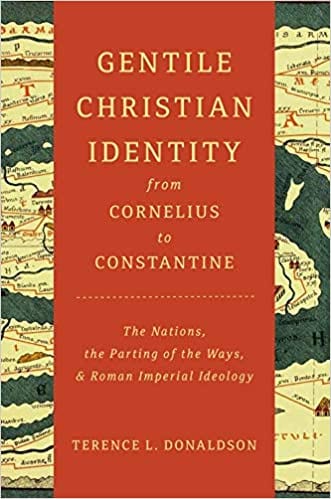Q. So this matter becomes the more and more complex, the more ways you look at it?
A. I don’t see any easy way of solving this set of problems. When I want to be precise, I use “non-Jewish nations” (or ethnic people groups) and “members of non-Jewish nations” (or ethnic people groups) for the two different Jewish uses of ethnē. But these are cumbersome phrases, awkward enough in academic prose and unthinkable in full translations of ancient sources. For the purposes of this book, after a discussion of the problems involved in translating the term, I then use the transliterated form ethnē, and leave it at that.
A couple of additional points before moving on to Christian usage. In scholarly literature we frequently encounter the statement that the Greeks also used ethnē in a manner analogous to the distinctive Jewish usage—that is, to denote non-Greek nations, the nations other than the Greeks (sometimes in a pejorative way). To support this reading, appeal is usually made to the entry for ethnos in the Liddell-Scott-Jones lexicon (“foreign, barbarous nations” [2b]). An investigation of the references cited in the lexicon, however, indicates that in every case the term ta ethnē is used not in an absolute sense, as in Jewish usage, but is modified in one way or another (adjective, adjectival phrase or clause; e.g., “nomadic nations”); in each case the idea of non-Greek nations is conveyed not by ta ethnē itself but by the modifier. I am not aware of any instance in Greek literature where ta ethnē by itself refers to non-Greek nations. So while non-Jews would find the Jewish use of ethnē to be odd, we shouldn’t assume that they were already familiar with an analogous negative use of the term with respect to “barbarians.” (In addition, of course, both biblical material and later Jewish literature also displays positive attitudes towards the ethnē.)
Things were a little different in Roman discourse. In Latin material, “the nations” (gentes; also nationes) often denoted the nations other than the Roman people (the populus Romanus as distinct from the gentes). Sometimes there were negative connotations—the nations as conquered or as enemies. Quite often, though, the term was used to speak of the other nations in a more positive sense. In particular, Rome prided itself not only on its conquest of the other nations, but also on civilizing the barbarian nations and drawing “all the nations” (omnes gentes) into a peaceable trans-ethnic empire. Cicero, for example, describes Rome as “the light of the whole world and the fortress of all the nations (omnes gentes).”
Further, in Rome-friendly literature written in Greek, there is some evidence that ethnos and ethnē were used to denote Roman provinces. The clearest evidence comes from the second century CE (e.g., Appian), though there are some possible first-century instances. I don’t think this is significant for Gentile Christian self-definition, but it might have a bearing on Paul’s self-understanding as the apostle to the ethnē, especially in view of his preference for provincial names with reference to his ministry (Cilicia, Asia, Macedonia, Achaia, etc.).
The third area of complexity and confusion has to do with Christian usage. As you note, Paul can use ethnē both as an identity that non-Jewish believers continue to possess (“you ethnē”) and as a term for outsiders (e.g., 1 Cor 5:1) or for what non-Jewish believers used to be (1 Cor 12:2). The ambiguity is understandable: Seen from one perspective, non-Jewish believers were certainly in a different category than other non-Jews; they were no longer ethnē in that sense. But from the other perspective, non-Jewish believers continued to be differentiated from Jews—both Jews in general and Jewish Christ-believers in particular—and thus could continue to be seen as ethnē.
So when we ask about how non-Jewish believers responded to the identifier ethnē, we need to recognize that they had some options. One of the results of my study is that we can detect a definite shift that becomes apparent in the mid-second century. Prior to that point, where ethnē appears in gentile Christian material it most commonly is used as a term for outsiders. While this might have also implied “what we used to be,” this is certainly not to the fore. But with the emergence of apologists such as Justin and the desire to present the Christian group in terms that would make sense to intelligent Greco-Romans, ethnē becomes very prominent as a self-identifying term, its prominence due to its usefulness in the competitive identity environment of the Greco-Roman world.













